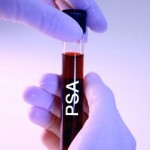In what may go down as one of the most controversial—and most damaging—pieces of healthcare policy in decades, the U.S. Preventive Services Task Force just issued a recommendation that men should no longer get routine screenings for prostate cancer. They believe that the test—called PSA, for the prostate-specific antigen it measures—does more harm than good.
 But reaction among health groups has been swift. The Men’s Health Network (MHN) and the Veterans Health Council (VHC) issued a joint press-release that condemned the Task Force’s recommendation, saying that the PSA test, used with a DRE (digital rectal exam), is the only method currently available for the early detection of prostate cancer.
But reaction among health groups has been swift. The Men’s Health Network (MHN) and the Veterans Health Council (VHC) issued a joint press-release that condemned the Task Force’s recommendation, saying that the PSA test, used with a DRE (digital rectal exam), is the only method currently available for the early detection of prostate cancer.
MHN’s Vice President, Scott Williams said, “Early detection saves lives. And this recommendation essentially eliminates access for patients and their healthcare providers to the only test available for early detection of prostate cancer.”
The Task Force’s main argument is that an elevated PSA number might lead men to pursue unnecessary treatments, including some that might cause impotence or incontinence. They try to support that position by making comparisons between the PSA and two medical tests that have turned out to not be beneficial: chest x-rays that were used to diagnose lung cancers, and women with breast cancer in the 1990s who were offered bone marrow transplants as a possible cure. The big difference here is that both chest x-rays and bone marrow transplants are invasive and involve some medical risk. But the PSA—even if it turns out to be completely useless–is a blood test. A completely non-invasive procedure.
The question, then, is: If you could take a blood test that might tell you whether you have cancer, wouldn’t you at least want to have the option to find out? No one is forcing men to have any procedures at all. The unavoidable subtext behind the Task Force’s recommendations is that men and their doctors aren’t smart enough to evaluate treatment options before beginning invasive treatments.
The Task Force based its recommendation on the PLCO (Prostate, Lung, Colorectal, Ovarian) that many argue was flawed. For example, at least 15 percent of prostate cancer participants never had a PSA at all. And only 14 percent of participants were African Americans, who have the highest risk of any group of developing prostate cancer. Vietnam Veterans were also noticeably absent from the study, despite the fact that veterans exposed to Agent Orange had more-than double the prostate cancer risk, and that when diagnosed, the cancer was more aggressive.
“If allowed to stand, USPSTF clearly abrogates its responsibility for the health and wellbeing of America’s Vietnam veterans,” said Thomas Berger, PhD, the VHC’s Executive Director.
The Task Force completely disregarded a far larger—and less flawed—study, the European Randomized Study of Screening for Prostate Cancer (ERSPC)—has found that the PSA has resulted in a 29 percent reduction in prostate-cancer mortality. It also disregarded a number of other studies that offer conclusive evidence that PSA testing saves lives. In addition, the Task Force specifically excludes from membership any relevant medical specialists, such as oncologists and urologists.
The American Urological Association—which, arguably, knows more about male plumbing than anyone—was “outraged” by the Task Force’s recommendation. According to their official statement, “Men who are in good health and have more than a 10-15 year life expectancy should have the choice to be tested and not
discouraged from doing so.”



